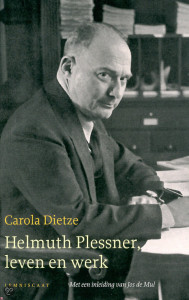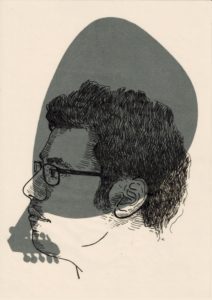‘Aan deze zijde van de utopie’ ~ De wijsgerige antropologie van Helmuth Plessner
 Wie een thuis zoekt, een vaderland, geborgenheid, moet zich uitleveren aan het geloof. Maar wie vasthoudt aan de geest, keert niet terug. Telkens weer zijn andere ogen nodig om op een andere manier zichtbaar te maken wat allang gezien, maar niet bewaard kon blijven. ~ Helmuth Plessner
Wie een thuis zoekt, een vaderland, geborgenheid, moet zich uitleveren aan het geloof. Maar wie vasthoudt aan de geest, keert niet terug. Telkens weer zijn andere ogen nodig om op een andere manier zichtbaar te maken wat allang gezien, maar niet bewaard kon blijven. ~ Helmuth Plessner
De afgelopen decennia laten een groeiende belangstelling zien voor het werk van de Duitse bioloog, filosoof en socioloog Helmuth Plessner (1892–1985). De organisatoren van het eerste Internationale Plessner Congress, dat in 2000 in Freiburg plaatsvond, durfden zelfs te spreken van een Plessner Renaissance. Misschien is dat enigszins ongelukkig uitgedrukt, omdat eigenlijk alleen van een wedergeboorte gesproken kan worden in Duitsland en Nederland, de twee landen waarin hij werkzaam is geweest. Buiten deze beide landen is het werk van Plessner tijdens diens leven vrijwel onopgemerkt gebleven, zodat daar eerder gesproken moet worden van een late geboorte van een Plessner-receptie. En zelfs in Duitsland en Nederland, waar Plessner een zekere bekendheid verwierf als een van de grondleggers en belangrijkste vertegenwoordigers van de twintigste-eeuwse wijsgerige antropologie en ook als een scherpzinnig interpreet van de ideeënhistorische wortels van het nationaalsocialisme, heeft zijn werk altijd in de schaduw gestaan van zijn tijdgenoot Martin Heidegger (1889-1976).
Voor het aanvankelijk uitblijven van een omvangrijke werkingsgeschiedenis van Plessners gedachtegoed zijn meerdere redenen te noemen. In de eerste plaats is er nog maar weinig vertaald van zijn omvangrijke oeuvre, waarvan een substantieel deel tussen 1980 en 1985 door Suhrkamp is uitgebracht onder de titel Gesammelte Schriften in 10 Bänden.[i] Bovendien zijn, met uitzondering van de Nederlandse, de meeste van deze vertalingen (in het Italiaans, Nederlands, Engels, Spaans, Frans, Pools en Russisch) van recente datum, en dan gaat het voornamelijk om artikelen en andere kleine geschriften.[ii] Zijn omvangrijke filosofische hoofdwerk, Die Stufen des Organischen und der Mensch (1928), is tot op heden onvertaald gebleven (hoewel er al enige tijd een Engelse vertaling in de maak is).
Dat zijn omvangrijke oeuvre tot dusver te weinig aandacht heeft gekregen, komt ook doordat Plessner na de machtsovername door Hitler als Halbjude zijn universitaire lesbevoegdheid in Duitsland verloor en van 1933 tot 1952 – met uitzondering van de jaren tussen 1943 en 1945, waarin hij als onderduiker op verschillende adressen in Utrecht en Amsterdam verbleef – werkzaam was in Groningen, eerst als buitengewoon hoogleraar sociologie en later als hoogleraar filosofie. Deze bijzondere omstandigheden hebben ertoe bijgedragen dat hij aanvankelijk nauwelijks school heeft gemaakt. En voor zover Plessner zelf deel uitmaakte van een filosofische ‘school’ – die van de wijsgerige antropologie[iii] – werd de praktische samenwerking met de twee belangrijkste mederepresentanten, Max Scheler (1874-1928) en Arnold Gehlen (1904-1976), verhinderd door respectievelijk een verstoorde persoonlijke verhouding en een tegengestelde politieke ideologie.
Met dat laatste hangt wellicht de derde reden samen voor de vertraagde receptie van Plessners werk. Zijn bereidheid om zijn eigen denken altijd weer kritisch te blijven bezien, viel op een weinig vruchtbare bodem in een eeuw die bijzonder vatbaar was voor totalitaire verleiding. Waar tijdgenoten als Heidegger en Gehlen de totalitaire ideologie van het nationaalsocialisme omarmden, belichaamt Plessners werk een radicale scepsis ten aanzien van iedere totalitaire ideologie.
Een dergelijke scepsis heeft ook aan het begin van de eenentwintigste eeuw nog niets aan betekenis verloren. In dat licht bezien komt de historische biografie van Carola Dietze als geroepen. Plessners persoonlijkheid, biografie en werk zijn namelijk nauw met elkaar verbonden. Het duidelijkst komt dat tot uitdrukking in zijn politiek gemotiveerde geschriften. Zijn pleidooi voor een open pluralistische samenleving in Grenzen der Gemeinschaft: Eine Kritik des sozialen Radikalismus (1924) vormt een reactie op de overspannen utopische gemeenschapsidealen die in de Weimar-republiek zowel door rechts – de national-völkische beweging – als links – de communisten – werden uitgedragen. En in het in Groningen geschreven en in Zürich gepubliceerde Das Schicksal deutschen Geistes im Ausgang seiner bürgerlichen Epoche (1935, in 1959 in een uitgebreidere editie heruitgegeven onder de titel Die Verspätete Nation: Über die politische Verführbarkeit bürgerlichen Geistes) analyseert hij de religieuze, sociale en filosofische wortels van het nationaalsocialisme, de beweging die hem veroordeelde tot het bestaan van politiek vluchteling. Read more
Translating The Arab-Jewish Tradition: From Al-Andalus To Palestine/Land Of Israel
This essay investigates the vision of two Jewish scholars of a shared Arab-Jewish history at the beginning of the twentieth century.
The first part of the essay focuses on Abraham Shalom Yahuda’s re-examination of the Andalusian legacy in regard of the process of Jewish modernisation with respect to the symbolic and the actual return to the East. The second part of the essay centers on the work of Yosef Meyouhas (1863-1942), Yahuda’s contemporary and life-long friend who translated a collection of Biblical stories from the Arab-Palestinian oral tradition, examining the significance of this work vis-à-vis the mainstream Zionist approach.[1]
A Dispute in Early Twentieth-Century Jerusalem
On a winter’s evening late in 1920, in an auditorium close to Jerusalem’s Damascus Gate (“bab al-‘amud”), Professor Abraham Shalom Yahuda (1877-1951) gave a lecture attended by an audience of Muslim, Christian and Jewish Palestinian intellectuals and public figures.[2] Its subject matter was the glory days of Arabic culture in al-Andalus.
The event was organized and hosted by the Jerusalem City Council in honour of the newly appointed British High Commissioner Herbert Samuel (1870-1963). In his opening address, Mayor Raghib al-Nashashibi (1881-1951) introduced the speaker as a Jerusalemite, son of one of the most respected Jewish families in the city.[3]
In his lecture, delivered in literary Arabic, Abraham Shalom Yahuda, since 1914 Professor of Jewish History and Literature and Arabic Culture at the University of Madrid portrayed the golden era of Muslim Spain describing the great accomplishments of Muslims and Jews during this period in the fields of science, literature, philosophy, medicine and art and emphasizing the fruitful relations between them. This event was an important moment in the life of this scholar of Semitic culture, one in which his long-standing scientific and political projects merged.
From his early days in Jerusalem, and later on in Germany as a student in Heidelberg and as a lecturer at the Berlin “Hochschule für die Wissenschaft des Judentums” (1904-1914), Yahuda had focused on the Andalusian legacy, emphasising the historical and philological aspects of the Judeo-Muslim symbiosis during that period and its symbolic significance for the modernization and revitalization of Jewish and Hebrew culture. This issue was at the heart of Yahuda’s long-standing debate with Jewish scholars regarding the different options for Jewish modernization. Towards the end of his lecture, Yahuda addressed the Arab Palestinians in the audience directly. Speaking from the heart, albeit in a slightly pompous tone, he called on them to revive the legacy of al-Andalus:
If the opportunity exists today for the Arabs to return to their ancient Enlightenment, it has been made possible only by virtue of the empires that fought for the rights of suppressed peoples.
If the Arabs revive their glorious past through the good will of these empires, especially that of Great Britain, which is willing to help them as much as possible, they have to return to their essence of generosity and allow the other suppressed peoples, including the People of Israel, to benefit from the national rights granted by the British Government. Only when the spirit of tolerance and freedom that prevailed in the golden age of Arab thought in al-Andalus […] will return to prevail today, in a way that will enable all peoples, without religious or ethnic prejudice, to work together for the revival of enlightenment in the Eastern nations, each people according to its unique character and traditions, can an all-encompassing Eastern enlightenment be reborn that will include all Eastern nations and peoples.[4]
Thus, Yahuda chose to end his lecture with a political statement regarding the future of Palestine in this new imperial era. Well aware of the importance of his words in such dramatic times, Yahuda proposed a symbolic return to al-Andalus as a potential political and cultural platform for Jews and Arabs in post-Ottoman Palestine. While it is hard not to see an affinity with the British Empire in his words, we should however note the unique context in which this lecture took place: a few months after the official beginning of British Mandatory rule in Palestine, at an occasion dedicated to the newly appointed High Commissioner Herbert Samuel and in his presence.[5]
However, the event also had a more specific historical context, as it took place on the same night that the third Arab National Congress opened in Haifa. The lecture was organized by Raghib al-Nashashibi in honour of Herbert Samuel, and Nashashibi invited Yahuda to give the main lecture. As the historian Safa Khulusi has suggested, this clash was probably not coincidental, but rather was part of the internal political struggle within the Arab Palestinian community.[6]
During the end of the Ottoman period, and more intensively throughout the British Mandate, the Palestinian political leadership was deeply divided between a few notable families.
The rivalry between the two leading Jerusalemite families—the Nashashibis and the Husseinis—split the local leadership into two main camps: the national camp, under Haj Amin al-Husseini, and the opposition camp, led by Raghib al-Nashashibi. Both families drew supporters from other elite families and refused to cooperate with each other, resulting in a deep political divide in Palestinian society.[7]
This split, which dominated the Palestinian political arena throughout the Mandatory period, had its origins in the early days of British rule, when Raghib al-Nashashibi was appointed Mayor of Jerusalem after the British Military Commissioner removed Musa Kazim al-Husseini (1853-1934) from office.[8]
The three-day Arab congress in Haifa was organized by members of the al-Husseini family and led by Kazim al-Husseini.
Just a few months after the French army destroyed the short-lived constitutional Arab Kingdom of Syria under King Faysal (1885-1933), and amid the ruins of the first modern Arab state in Bilad al-Sham (Greater Syria) that projected equal citizenship to all, the participants in the Haifa congress sought to establish a new strategy towards British rule and towards the Balfour Declaration and the notion of a homeland for the Jewish people.
Herhalingsrecepten: Noach’s pudding in De bastaard van Istanbul
Tzadjiki, is dat nu Turks of Grieks? Ik probeer mijn buurmeisje uit te leggen dat het van het Turkse woord cacık komt en dat het waarschijnlijk eerder uit de Turkse keuken afkomstig is dan uit de Griekse, omdat het basisingrediënt, yoghurt, samen met de Turken en Mongolen uit Centraal-Azië is gekomen. Maar ze gelooft me niet. En waarom zou ze ook? Het is heel moeilijk om vast te stellen waar gerechten nu echt vandaan komen. Omdat ze een onderdeel zijn van het gewone dagelijkse leven zijn er maar weinig schriftelijke bronnen waarin iets over hun herkomst en bereiding wordt verteld. Bovendien reizen gerechten en eetgewoontes door de tijden heen, en worden ze door etnische en religieuze gemeenschappen van elkaar overgenomen. Zeker in het Middellandse Zeegebied en het Midden-Oosten zijn er veel gerechten die in verschillende culturen opduiken, al is het vaak onder een andere naam.
Van dit verschijnsel maakt de Turkse schrijfster Elif Shafak in haar roman De bastaard van Istanbul op ruime schaal gebruik. Centraal staat in De bastaard van Istanbul de houding ten opzichte van de Armeense genocide van enerzijds de Turken in Turkije en anderzijds de Armeniërs in de diaspora. Elif Shafak onderbouwt dit thema door te spelen met de overeenkomst in eetcultuur. Ze gebruikt de duplicatie van eetcultuur en gerechten om de culturele verwantschap tussen Turken en Armeniërs in beeld te brengen. Verder speelt eten in deze roman ook een rol op het niveau van de structuur van het boek.
De schrijfster
Elif Shafak is een relatief jonge schrijfster die op dit moment heel populair is in Turkije, maar vooral ook daarbuiten. Ze heeft als dochter van een diplomate een deel van haar jeugd doorgebracht in het buitenland. Na haar middelbare school is ze teruggekeerd naar Turkije, waar ze sociologie en vrouwenstudies heeft gestudeerd. Ze heeft jarenlang een academische carrière gecombineerd met het schrijverschap.1 Een aantal jaren schreef ze columns voor de liberaal-religieuze krant Zaman. Deze krant is de laatste jaren flink in opkomst onder jonge Turkse intellectuelen die zich distantiëren van het strenge secularisme, en is gelieerd aan de ‘Gülen-beweging’.2
Vanwege haar roman De Bastaard van Istanbul is tegen Shafak een rechtszaak aangespannen door de ultranationalistische advocaat Kemal Kerinçsiz. Deze heeft, zonder veel succes, meerdere prominente Turkse schrijvers aangeklaagd wegens het beledigen van de Turkse staat, waaronder ook Nobelprijswinnaar Orhan Pamuk. Shafak is uiteindelijk vrijgesproken. Het proces heeft haar veel internationale en nationale publiciteit opgeleverd. Inmiddels heeft Elif Shafak twee kinderen en richt ze zich op een breed scala van schrijfactiviteiten, variërend van literatuur tot songteksten.
De bastaard van Istanbul
De bastaard van Istanbul vertelt over twee families, een Turkse familie die in Istanbul leeft en een Armeense familie van Turks/Istanbulse afkomst in de diaspora, die in San Francisco woont. De Turkse familie bestaat uit een overgrootmoeder, haar schoondochter, vier dochters en één zoon, Mustafa, die in Amerika woont. Voordat deze Mustafa uit Istanbul wegging, heeft hij zijn zus Zeliha verkracht. Hieruit is een dochter geboren, Asya, die samen met alle andere vrouwen van de familie in een oude villa woont. Niemand, behalve Zeliha en haar oudste zus Banu, weten wie Asya’s vader is. Asya is negentien jaar, studeert filosofie en is een vrijgevochten, cynische, seculiere jonge vrouw. Ze heeft een groep vrienden die ze dagelijks in café Kundera ontmoet. Het zijn voornamelijk nihilistische, anarchistische mannen van middelbare leeftijd met teloorgegane artistieke ambities. Met een van hen heeft Asya een buitenechtelijke relatie. Read more




